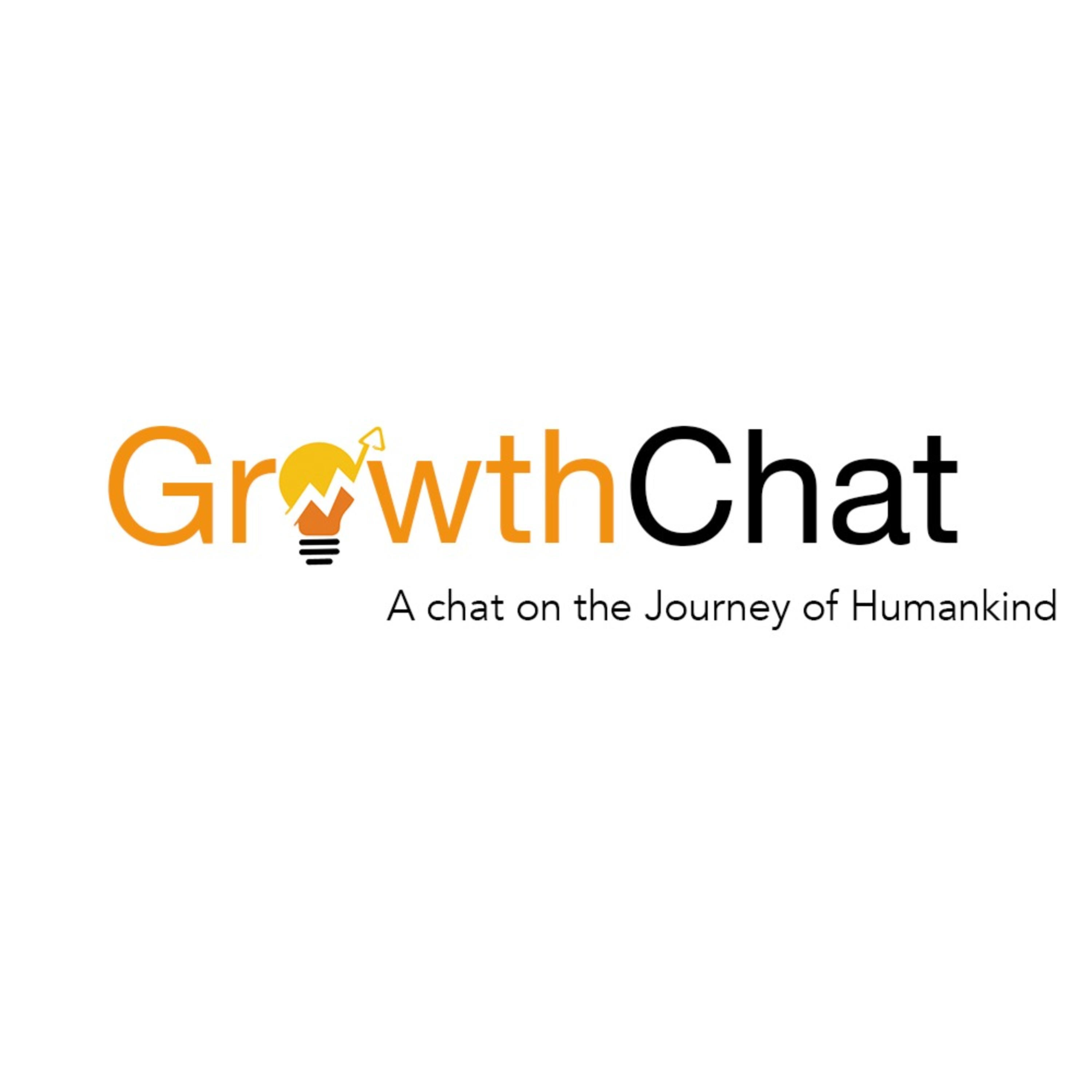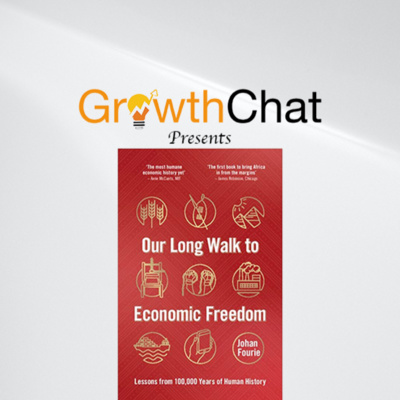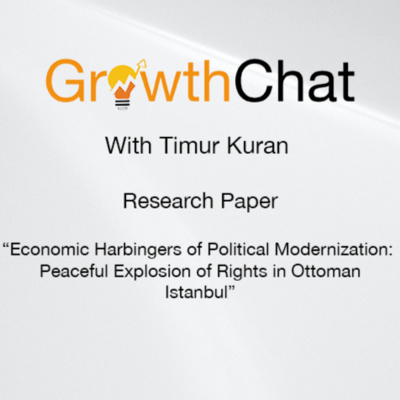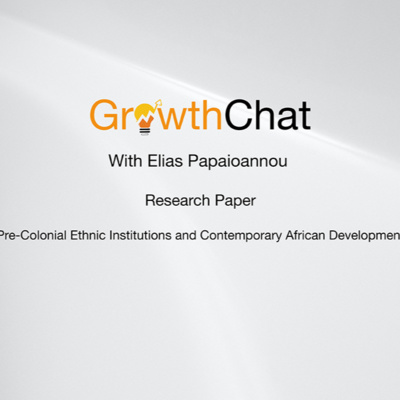Discover GrowthChat by Marco Lecci and Sascha O. Becker
GrowthChat by Marco Lecci and Sascha O. Becker

GrowthChat by Marco Lecci and Sascha O. Becker
Author: GrowthChat
Subscribed: 12Played: 123Subscribe
Share
© GrowthChat
Description
A podcast series where we interview economists and other social scientist asking about their recent research papers and publications. The aim of this podcast is to share the work that economists, sociologist, anthropologist and historians do, making it accessible to students and the general public, independently from their background and preparation.
23 Episodes
Reverse
GrowthChat is a podcast on the social and cultural journey of humankind, hosted by Marco Lecci and Sascha O. Becker.
In this episode we chat with Timur Kuran about his book "Freedoms Delayed: Political Legacies of Islamic Law in the Middle East”. Timur explores the lasting political effects of the Middle East's lengthy exposure to Islamic law. It identifies several channels through which Islamic institutions, both defunct and still active, have limited the expansion of basic freedoms under political regimes of all stripes: secular dictatorships, electoral democracies, monarchies legitimated through Islam, and theocracies. Kuran suggests that Islam's rich history carries within it the seeds of liberalization on many fronts; and that the Middle East has already established certain prerequisites for a liberal order. But there is no quick fix for the region's prevailing record of human freedoms.
GrowthChat is a podcast on the social and cultural journey of humankind, hosted by Marco Lecci and Sascha O. Becker. In this episode we chat with Daron Acemoglu about his book "Power and Progress: Our Thousand-Year Struggle Over Technology and Prosperity" co-authored with Simon Johnson. Progress depends on the choices we make about technology. New ways of organizing production and communication can either serve the narrow interests of an elite or become the foundation for widespread prosperity. With their breakthrough economic theory and manifesto for a better society, Acemoglu and Johnson provide the vision needed to reshape how we innovate and who really gains from technological advances.
GrowthChat is a podcast on the social and cultural journey of humankind, hosted by Marco Lecci and Sascha O. Becker. In this episode we chat with Leah Boustan and Ran Abramitzky about their book "Streets of Gold: America's Untold Story of Immigrant Success’”. Immigration is one of the most fraught, and possibly most misunderstood, topics in American social discourse—yet, in most cases, the things we believe about immigration are based largely on myth, not facts. Using the tools of modern data analysis and ten years of pioneering research, new evidence is provided about the past and present of the American Dream, debunking myths fostered by political opportunism and sentimentalized in family histories.
GrowthChat is a podcast on the social and cultural journey of humankind, hosted by Marco Lecci and Sascha O. Becker. In this episode we chat with David Weil about his paper "Measuring Economic Growth from Outer Space’”. David and his co-authors, J. Vernon Henderson and Adam Storeygard, use nigh lights from satellite data as a proxy for GDP measure. As an application, they examine growth in Sub Saharan African regions over the last 17 years. They find that real incomes in non-coastal areas have grown faster by 1/3 of an annual percentage point than coastal areas; non-malarial areas have grown faster than malarial ones by 1/3 to 2/3 annual percent points; and primate city regions have grown no faster than hinterland areas. Such applications point toward a research program in which "empirical growth" need no longer be synonymous with "national income accounts."
GrowthChat is a podcast on the social and cultural journey of humankind, hosted by Marco Lecci and Sascha O. Becker. In this episode we chat with Johan Fourie about his book "Our Long Walk to Economic Freedom: Lessons from 100,000 Years of Human History", published by Cambridge University Press. Our Long Walk to Economic Freedom is an entertaining and engaging guide to global economic history told for the first time from an African perspective. In thirty-five short chapters Johan Fourie tells the story of 100,000 years of human history spanning humankind's migration out of Africa to the Covid-19 pandemic. His unique account reveals just how much we can learn by asking unexpected questions such as 'How could a movie embarrass Stalin?', 'Why do the Japanese play rugby?' and 'What do an Indonesian volcano, Frankenstein and Shaka Zulu have in common?'. The book sheds new light on urgent debates about the roots and reasons for prosperity, the march of opportunity versus the crushing boot of exploitation, and why it is the builders of society – rather than the burglars –who ultimately win out.
GrowthChat is a podcast on the social and cultural journey of humankind, hosted by Marco Lecci and Sascha O. Becker. In this episode we chat with Alessio Terzi about his book "Growth for Good: Reshaping Capitalism to Save Humanity from Climate Catastrophe". Economic growth is wrecking the planet. It’s the engine driving climate change, pollution, and the shrinking of natural spaces. To save the environment, will we have to shrink the economy? Might this even lead to a better society, especially in rich nations, helping us break free from a pointless obsession with material wealth that only benefits the few? Alessio Terzi takes these legitimate questions as a starting point for a riveting journey into the socioeconomic, evolutionary, and cultural origins of our need for growth. It’s an imperative, he argues, that we abandon at our own risk. Terzi ranges across centuries and diverse civilizations to show that focus on economic expansion is deeply interwoven with the human quest for happiness, well-being, and self-determination. Growth, he argues, is underpinned by core principles and dynamics behind the West’s rise to affluence. These include the positivism of the Enlightenment, the acceleration of science and technology and, ultimately, progress itself. Today growth contributes to the stability of liberal democracy, the peaceful conduct of international relations, and the very way our society is organized through capitalism. Abandoning growth would not only prove impractical, but would also sow chaos, exacerbating conflict within and among societies. This does not mean we have to choose between chaos and environmental destruction. Growth for Good presents a credible agenda to enroll capitalism in the fight against climate catastrophe. With the right policies and the help of engaged citizens, pioneering nations can set in motion a global decarbonization wave and in parallel create good jobs and a better, greener, healthier world.
GrowthChat is a podcast on the social and cultural journey of humankind, hosted by Marco Lecci and Sascha O. Becker. In this episode we chat with Mark Koyama and Jared Rubin about their book "How the World Became Rich: the historical origins of economic growth". Most humans are significantly richer than their ancestors. Humanity gained nearly all of its wealth in the last two centuries. How did this come to pass? How did the world become rich? Mark Koyama and Jared Rubin dive into the many theories of why modern economic growth happened when and where it did. They discuss recently advanced theories rooted in geography, politics, culture, demography, and colonialism. Pieces of each of these theories help explain key events on the path to modern riches. Why did the Industrial Revolution begin in 18th-century Britain? Why did some European countries, the US, and Japan catch up in the 19th century? Why did it take until the late 20th and 21st centuries for other countries? Why have some still not caught up? Koyama and Rubin show that the past can provide a guide for how countries can escape poverty. There are certain prerequisites that all successful economies seem to have. But there is also no panacea. A society’s past and its institutions and culture play a key role in shaping how it may – or may not – develop
GrowthChat is a podcast on the social and cultural journey of humankind, hosted by Marco Lecci and Sascha O. Becker. In this episode we chat with Timur Kuran about his paper "Economic Harbingers of Political Modernization: Peaceful Explosion of Rights in Ottoman Istanbul”. Timur, looking at the Ottoman empire, explores the conditions under which fundamental rights expand without major resistance allowing radical institutional reforms in a peaceful context.
GrowthChat is a podcast on the social and cultural journey of humankind, hosted by Marco Lecci and Sascha O. Becker. In this episode we chat with Melissa Dell about her paper "The Persistent Effect of Peru’s Mining Mita”. Melissa examines the long-run impacts of the Mita, an extensive forced mining labor system in effect in Peru and Bolivia between 1573 and 1812. She finds that a Mita effect lowers household consumption by around 25% and increases the prevalence of stunted growth in children by around 6 percentage points in subjected districts today.
GrowthChat is a podcast on the social and cultural journey of humankind, hosted by Marco Lecci and Sascha O. Becker. In this episode we chat with Elias Papaioannou about his paper "Pre-Colonial Ethnic Institutions and Contemporary African Development’”. Elias and his co-author, Stelios Michalopoulos, investigate the role of deeply rooted pre-colonial ethnic institutions in shaping comparative regional development within African countries. They find a strong positive association between pre-colonial political complexity and contemporary development
GrowthChat is a podcast on the social and cultural journey of humankind, hosted by Marco Lecci and Sascha O. Becker. In this episode we chat with Raul Sanchez de la Sierra about his paper "On the Origins of the State: Stationary Bandits and Taxation in Eastern Congo’”. Raul, in his paper, finds that armed actors may create “essential functions of a state” to better expropriate, which, depending on their goals, can increase welfare.
GrowthChat is a podcast on the social and cultural journey of humankind, hosted by Marco Lecci and Sascha O. Becker. In this episode we chat with Stelios Michalopoulos about his paper "The long-run effects of the ‘Scramble for Africa’”. Stelios and his co-author, Elias Papaioannou, look into the effect imposed borders had on splitting ethnicities across countries in Africa. they find that colonial border designs have spurred political violence and that ethnic partitioning is systematically linked to civil conflict, discrimination by the national government, and instability.
GrowthChat is a podcast on the social and cultural journey of humankind, hosted by Marco Lecci and Sascha O. Becker. In this episode we chat with Paola Giuliano about her paper "On the Origins of Gender Roles: Women and the Plough”. Paola and her co-authors, Alberto Alesina and Nathan Nunn, study the historical origins of existing cross-cultural differences in beliefs and values regarding the appropriate role of women in society. They test the hypothesis that traditional agricultural practices influenced the historical gender division of labor and the evolution of gender norms. They authors find that the descendants of societies that traditionally practiced plough agriculture today have less equal gender norms, measured using reported gender-role attitudes and female participation in the workplace, politics, and entrepreneurial activities.
GrowthChat is a podcast on the social and cultural journey of humankind, hosted by Marco Lecci and Sascha O. Becker. In this episode we chat with Gupta Bishnupriya about her paper "Falling Behind and Catching up — India’s Transition from a Colonial Economy”. Gupta study how India fell behind during colonial rule. Inadequate investment in agriculture and consequent decline in yield per acre stalled economic growth. Modern industries emerged and grew relatively fast. The reversal began after independence. Policies of industrialization and a green revolution in agriculture increased productivity in agriculture and industry.
GrowthChat is a podcast on the social and cultural journey of humankind, hosted by Marco Lecci and Sascha O. Becker. In this episode we chat with Leonard Wantchekon about his paper "The Slave Trade and the Origins of Mistrust in Africa”. Leonard and his co-author, Nathan Nunn, study why the current differences in trust levels within Africa can be traced back to the transatlantic and Indian Ocean slave trades. Combining contemporary individual-level survey data with historical data on slave shipments by ethnic group, they find that individuals whose ancestors were heavily raided during the slave trade are less trusting today.
GrowthChat is a podcast on the social and cultural journey of humankind, hosted by Marco Lecci and Sascha O. Becker.
In this episode we chat with Sara Lowes about her paper "The Legacy of Colonial Medicine in Central Africa”. Sara and her co-author study how the delivery of health aid can be jeopardised by distrust at the local level. Using evidence from French military campaigns in Cameroon and former French Equatorial Africa they show that a significant reason for this distrust may be aid recipients’ historical experiences of colonial medical campaigns. This is having a huge impact, worsening health outcomes and lowering World Bank health project success today.
GrowthChat is a podcast on the social and cultural journey of humankind, hosted by Marco Lecci and Sascha O. Becker. In this episode we chat with Davide Ticchi about his paper "Forbidden Fruits: The Political Economy of Science, Religion, and Growth”. Davide and his co-authors study the coevolution of religion, science and politics and they find a negative relationship between religiosity and patents per capita. They categorized three different regimes and outcomes. Western-European Secularization regime has declining religiosity, unimpeded science, and high taxes and transfers. The Theocratic regime involves knowledge stagnation, unquestioned dogma, and high religious-public-goods spending. The American regime combines scientific progress and stable religiosity through doctrinal adaptations, with low taxes and some fiscal-legal advantages for religious activities. Paper link: DOI: https://doi.org/10.1257/aer.20140832Learn more about Davide: https://works.bepress.com/davideticchi/Follow Growth Chat on Twitter: https://twitter.com/Growth_Chat
GrowthChat is a podcast on the social and cultural journey of humankind, hosted by Marco Lecci and Sascha O. Becker. In this episode we chat with Luigi Pascali about his paper "The Wind of Change: Maritime Technology, Trade, and Economic Development”. Luigi finds that the introduction of the steamship in the shipping industry produced an asymmetric change in trade distances among countries. Before this invention, trade routes depended on wind patterns. The steamship reduced shipping costs and time in a disproportionate manner across countries and trade routes. He also argues that only a small number of countries, characterized by more inclusive institutions, benefited from trade integration; and that globalization was the major driver of the economic divergence between the rich and the poor portions of the world in the years 1850-1900.
GrowthChat is a podcast on the social and cultural journey of humankind, hosted by Marco Lecci and Sascha O. Becker.
In this episode we chat with Melanie Xue about her paper "Folklore”. Melanie and her co-author, Stelios Michalopoulos, focus their research on Folklore, interpreted as the collection of traditional beliefs, customs, and stories of a community passed through the generations by word of mouth. They find that societies with tales portraying men as dominant and women as submissive tend to relegate their women to subordinate positions in their communities, both historically and today. More risk-averse and less entrepreneurial people grew up listening to stories where competitions and challenges are more likely to be harmful than beneficial. Communities with low tolerance towards antisocial behavior, captured by the prevalence of tricksters getting punished, are more trusting and prosperous today.
GrowthChat is a podcast on the social and cultural journey of humankind, hosted by Marco Lecci and Sascha O. Becker. In this episode we chat with Andrea about his paper "The Ant and the Grasshopper: Seasonality and the Invention of Agriculture”. Andrea finds that the invention and adoption of agriculture were both a response to a large increase in climatic seasonality. In the most affected regions, hunter-gatherers abandoned their traditional nomadism in order to store food and smooth their consumption. Their new sedentary lifestyle greatly simplified the invention and adoption of agriculture. Seasonality patterns 10,000 years ago were amongst the major determinants of the present day global distribution of crop productivities, ethnic groups, cultural traditions, and political institutions.






















